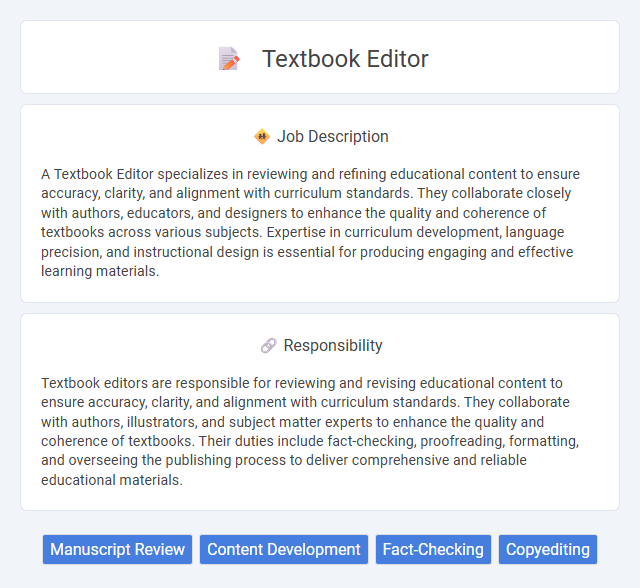
A Textbook Editor specializes in reviewing and refining educational content to ensure accuracy, clarity, and alignment with curriculum standards. They collaborate closely with authors, educators, and designers to enhance the quality and coherence of textbooks across various subjects. Expertise in curriculum development, language precision, and instructional design is essential for producing engaging and effective learning materials.
Individuals with strong attention to detail and a passion for literature are likely well-suited for a textbook editor role. Those who enjoy organizing complex information and have patience for repetitive revisions may find this job fulfilling. However, people who prefer fast-paced or highly social environments might be less compatible with the typically solitary and meticulous nature of textbook editing.
Qualification
A Textbook Editor must possess a strong command of language, exceptional proofreading skills, and expertise in educational content standards. Familiarity with curriculum requirements, experience in academic publishing, and proficiency in style guides such as APA or Chicago are essential qualifications. Candidates should also demonstrate the ability to collaborate with authors, instructional designers, and subject matter experts to ensure accuracy and clarity in textbook materials.
Responsibility
Textbook editors are responsible for reviewing and revising educational content to ensure accuracy, clarity, and alignment with curriculum standards. They collaborate with authors, illustrators, and subject matter experts to enhance the quality and coherence of textbooks. Their duties include fact-checking, proofreading, formatting, and overseeing the publishing process to deliver comprehensive and reliable educational materials.
Benefit
A Textbook Editor role may offer significant benefits such as opportunities for professional growth in the educational publishing industry and a chance to influence curriculum quality. This position might provide access to a collaborative work environment that fosters creativity and learning. Compensation packages could include competitive salaries and benefits tailored to support work-life balance, enhancing overall job satisfaction.
Challenge
Textbook editors likely face the challenge of balancing accuracy with clarity, ensuring complex academic content is both precise and accessible to diverse readers. They may need to navigate tight deadlines while coordinating with authors, illustrators, and publishers, which can complicate the editing process. The role might also require adapting content to align with evolving educational standards and technologies, presenting an ongoing challenge.
Career Advancement
Textbook editors play a crucial role in refining educational content to meet academic standards and enhance learner comprehension. Advancing in this career often involves gaining expertise in subject matter, mastering editorial technologies, and building strong connections within publishing houses. Professionals who develop skills in digital content creation and project management frequently move into senior editorial positions or roles in educational consulting.
Key Terms
Manuscript Review
Textbook editors specializing in manuscript review meticulously evaluate content accuracy, coherence, and alignment with curriculum standards to ensure educational effectiveness. They collaborate closely with authors to refine language, structure, and factual information, enhancing readability and pedagogical value. Proficiency in subject matter expertise and editorial best practices is essential for maintaining high-quality instructional materials.
Content Development
Textbook editors specializing in content development ensure the accuracy, clarity, and alignment of educational materials with curriculum standards. They collaborate with authors, subject matter experts, and designers to create engaging, age-appropriate content that enhances student comprehension and retention. Their role involves continuous review and revision to incorporate the latest research findings and pedagogical innovations.
Fact-Checking
A Textbook Editor specializing in fact-checking ensures all content is accurate, reliable, and aligns with current academic standards. This role involves verifying dates, figures, names, and scientific data against authoritative sources to prevent misinformation. Fact-checking enhances the textbook's credibility, supporting educators and students with dependable educational material.
Copyediting
A Textbook Editor specializing in copyediting ensures academic materials are free from grammatical, typographical, and formatting errors to maintain clarity and consistency. This role involves meticulous review of educational content, verifying accuracy in terminology, style, and coherence across chapters according to specific publishing guidelines. Expertise in language precision and content standardization is crucial for enhancing the readability and professional quality of textbooks.
 kuljobs.com
kuljobs.com